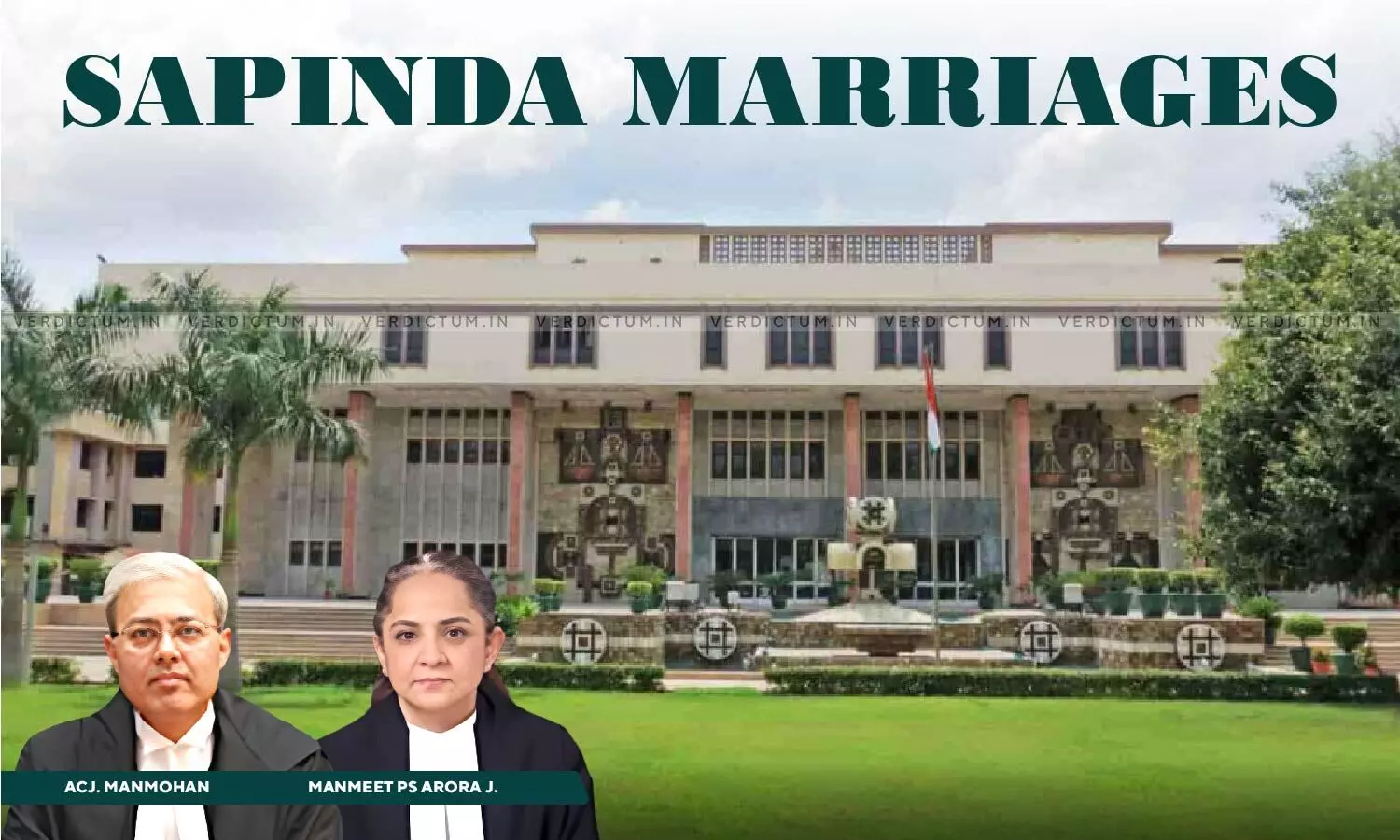
Incestuous Relationship May Gain Legitimacy: Delhi HC Upholds Constitutional Validity Of Section 5(V) HMA Prohibiting ‘Sapinda’ Marriages
 |
|The Delhi High Court upheld the constitutional validity of Section 5(v) of the Hindu Marriage Act, 1955 (HMA) that prohibits ‘Sapinda’ marriages i.e., the marriages between the parties who are related to each other in Hinduism. ‘Sapinda’ is a term used in context of cousin marriages.
The Court was deciding a writ petition seeking issuance of an appropriate writ for striking down Section 5(v) of the HMA.
A Division Bench comprising Acting Chief Justice Manmohan and Justice Manmeet Pritam Singh Arora observed, “The impugned Section has been dealt with in the aforesaid opinion of the Hon’ble Judge and its regulatory nature has been noted with approval at paragraph 591 therein. The discussion in the aforesaid concurring opinion of the judgment negates the challenge raised by the Petitioner on the grounds of violation of Article 21 of the Constitution of India inasmuch as the Hon’ble Judge has held that the choice of a partner in marriage is not absolute and is subject to regulations, which includes the exclusions to prohibited degrees. The Supreme Court in the aforesaid opinion noted that Section 5(v) of HMA Act is the State’s intent at societal reform through codification. We are of the opinion that if the choice of a partner in a marriage is left unregulated incestuous relationship may gain legitimacy.”
Advocate Tushar Kumar appeared for the petitioner while CGSC Apoorv Kurup appeared for the respondents.
Factual Background -
The petitioner was a woman whose marriage was solemnized with her distant cousin with the mutual consent of the families and by conducting the religious ceremony in presence of members of the civil society. However, the said cousin had succeeded in having the marriage declared null and void by seeking a declaration from a competent court under Section 5(v) of HMA. The counsel for the petitioner submitted that she became a victim of a fraud perpetuated by the cousin and his family members who induced her to believe in the validity of their marriage. The counsel further stated that the marriages amongst blood relatives is an established practice in southern states of India, more specifically in Tamil Nadu and Karnataka.
He also submitted that in the aforesaid regional States, the said marriages are protected due to the proof of custom; however, in the case of the petitioner, due to her inability to prove the existence of the custom in her community; during trial, her marriage with the said cousin was declared null and void. He stated that therefore, the impugned Section is violative of Article 14 of the Constitution. Furthermore, the counsel contended that that despite existence of Section 5(v) of the HMA, marriages are commonly solemnized between parties who are related to each other as sapindas, even in the absence of proof of custom and it is prevalent in the civil society and therefore, the impugned Section needs to be struck down to protect the interest of such women. He added that the striking down of the impugned Section is necessary to liberalize the citizens and to protect the affected women.
The High Court after hearing the contentions of the counsel noted that the petitioner has failed to set out any grounds for challenging the prohibition encapsulated in the impugned Section and has failed to plead any legal grounds for challenging the restriction imposed by the impugned Section.
“The petition neither identifies the basis of the said restriction imposed by the State and nor enlists any cogent legal ground for challenging the said impugned Section. This Court is unable to accept the contention of the Petitioner that the impugned section is violative of Article 14 of the Constitution of India as the exception in the impugned Section is only for marriages between persons on the basis of custom having force of law, which requires stringent proof and its existence is to be adjudicated upon by Court of law”, it held.
The Court said that the petitioner was unable to prove the existence of custom in the facts of her case and has relied upon consent of patents which cannot take the place of custom.
Accordingly, the High Court disposed of the petition.
Cause Title- Neetu Grover v. Union of India & Ors. (Neutral Citation: 2024:DHC:503-DB)
Appearance:
Petitioner: Advocates Junaid Qureshi, Dishani Guha, Varnika Bajaj, and Rishub Kapoor.
Respondents: Advocate Akhil Hasija and GP Archana Surve.